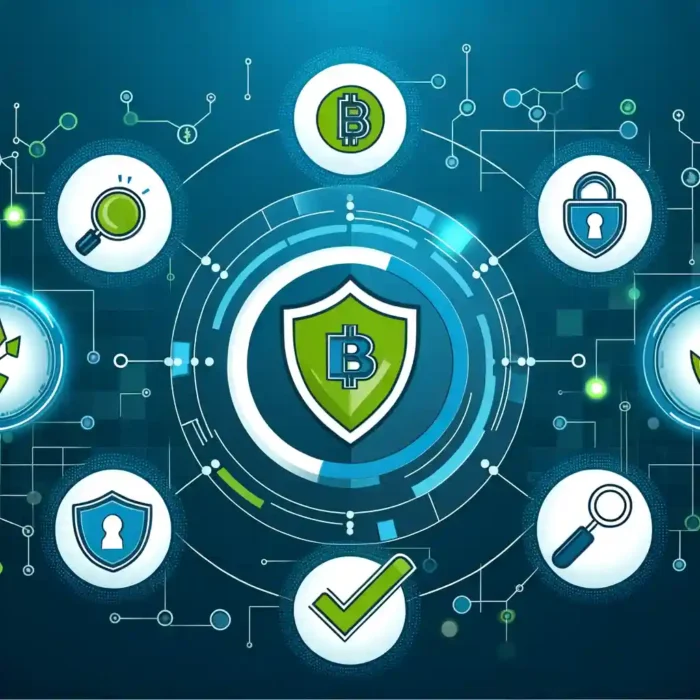Get Scam Alerts & The Latest Crypto News:
In the digital era, where the virtual and physical worlds have become seamlessly intertwined, the rumble of cryptocurrency has grown into an orchestral masterpiece for investors worldwide. However, with this new dawn of digital assets, the shadow of cyber threats looms large. Enter the realm of integrating cybersecurity in crypto due diligence practices where the wizards of technology and finance collaborate to weave a protective cloak around your valuable investments. This article will journey through the labyrinth of security measures that ought to be incorporated during crypto due diligence processes, ensuring that your treasure chest of digital gold remains impenetrable to the cyber ghouls lurking in the shadows. We’re about to embark on a fascinating exploration into the intricate dance of technology and finance, where every step counts towards safeguarding your digital fortune.
Understanding the Importance of Cybersecurity in Crypto Due Diligence
In the rapidly evolving world of cryptocurrency, it’s critical to integrate cybersecurity measures into due diligence processes. This is due to the unique vulnerabilities that cryptocurrencies face. Unlike traditional financial systems that rely on a centralized authority like a bank or government, cryptocurrencies are decentralized. This means that transactions are conducted directly between parties without any intermediates, making the system more susceptible to cyber threats.
Similarly, cryptocurrency transactions are irreversible. Once a transaction has been validated and added to the blockchain, it cannot be altered or reversed. This makes crypto assets a prime target for cybercriminals. Without proper cybersecurity measures, your investments can easily fall into the wrong hands. In essence, cybersecurity in crypto due diligence is not just an option, it’s a necessity.
| Aspect | Cybersecurity Relevance |
| Decentralization | Increase in vulnerability |
| Irreversible transactions | Prime target for cybercriminals |
| Investment protection | Essential for safe and secure transactions |
There are several ways to integrate cybersecurity into crypto due diligence. Firstly, it’s crucial to conduct a thorough audit of a cryptocurrency’s security infrastructure. This includes reviewing its blockchain technology, wallet security, and transaction verification processes. Secondly, consider the cybersecurity measures put in place by the cryptocurrency exchange you choose to use. These should include secure socket layer (SSL) encryption, two-factor authentication, and cold storage options for your crypto assets.
Lastly, remember that cybersecurity in cryptocurrency due diligence is not just a one-time task. It is an ongoing process that needs to be revisited periodically as new threats emerge, and technologies evolve. This includes staying updated with the latest cybersecurity trends, implementing necessary updates, and constantly monitoring your crypto assets for any signs of suspicious activity.
Building a Robust Cybersecurity Framework in Crypto Investment Analysis
In the rapidly evolving world of crypto investment, it is essential to consider cybersecurity as a key aspect of due diligence practices. With the increasing incidences of security breaches and data theft, building a robust cybersecurity framework becomes indispensable. Digital assets such as cryptocurrencies are vulnerable to cyber attacks and hence, integrating robust cybersecurity measures can safeguard your investments.
Understanding Cyber Risks in Crypto Investment
Crypto investments are not immune to cyber risks. Hackers are always on the prowl for vulnerabilities that they can exploit. From phishing attacks to malware and ransomware, there are numerous threats lurking in the digital sphere. Understanding these risks is the first step towards building a robust cybersecurity framework. Some common cyber threats include:
- Phishing: This is a common tactic used by cybercriminals where they impersonate legitimate businesses or individuals to trick victims into revealing sensitive information.
- Malware: Malicious software, or malware, can damage or disrupt a computer system, gather sensitive information or gain access to private computer networks.
- Ransomware: This is a form of malware where the attacker encrypts the victim’s data and demands a ransom to restore access to it.
Investing in crypto assets requires a deep understanding of not just the financial risks, but also the cyber risks associated with it. By integrating cybersecurity into your crypto investment analysis, you can protect your investments against potential cyber threats. Investing in a robust antivirus software, using secure wallets, and being cautious about phishing attacks can go a long way in safeguarding your digital assets.
Here’s a basic table that outlines some potential risks and mitigation strategies:
| Risk | Mitigation Strategy |
|---|---|
| Phishing | Invest in robust email security solutions and promote awareness amongst users. |
| Malware | Invest in a reliable antivirus software and ensure regular system updates. |
| Ransomware | Regularly backup data and use a secure and reliable cloud service. |
Cybersecurity must be an integral part of crypto due diligence practices. By understanding the cyber risks involved and taking the necessary precautions, you can better safeguard your investments against potential threats.
Assessing and Mitigating Cybersecurity Risks in Cryptocurrency Operations
In the evolving world of cryptocurrencies, one of the most important yet overlooked aspects is cybersecurity. As more individuals and organizations dive into crypto operations, it is crucial to be aware of the potential risks and take appropriate mitigation steps. Not only can these risks lead to a loss of assets, but they can also damage the reputation of the organizations involved.
The first step in mitigating cybersecurity risks involves assessing the potential threats. These threats can come in many forms, including:
- Phishing attacks: These occur when a hacker tricks a user into revealing sensitive information, such as their private keys or passwords.
- Software vulnerabilities: Hackers can exploit weak points in a software or system to gain unauthorized access.
- Physical attacks: These involve direct access to a user’s hardware or storage devices.
Once these risks have been assessed, it’s time to develop a robust mitigation strategy. Below are some proactive measures that can be integrated into due diligence practices:
| Measure | Description |
|---|---|
| Use of hardware wallets | These provide an offline storage solution for cryptocurrencies, reducing the risk of online attacks. |
| Implementation of two-factor authentication | This adds an extra layer of security by requiring two types of identification before granting access. |
| Regular software updates | Keeping software up-to-date ensures that any potential security flaws are addressed promptly. |
Integrating cybersecurity in crypto due diligence practices not only enhances the security posture of an organization but also instills a sense of trust and confidence in the stakeholders. Therefore, it’s vital to continuously assess potential risks and adopt proactive measures to mitigate them.
Recommendations for Incorporating Cybersecurity in Crypto Due Diligence
In the rapidly evolving world of cryptocurrency, it’s essential to incorporate cybersecurity measures into your due diligence practices. The decentralized, digital nature of crypto assets makes them particularly susceptible to online attacks. Thus, it’s vital to ensure that your investments are well-protected.
Understanding the Risks
Before implementing cybersecurity measures, one must first comprehend the unique risks associated with cryptocurrency. These include but are not limited to hacking, phishing attacks, fraudulent ICOs (Initial Coin Offerings), and the inherent volatility of the market.
Implementing Cybersecurity Measures
Once you’ve gained a solid understanding of the risks, it’s time to implement robust cybersecurity measures. Here are some recommendations:
- Use Two-Factor Authentication (2FA): This adds an extra layer of security to your accounts, making it harder for unauthorized users to gain access.
- Employ Cold Storage: Store your cryptocurrencies in offline environments, such as hardware or paper wallets, to minimize online threats.
- Hire Cybersecurity Experts: Professionals in the field can help identify potential vulnerabilities and recommend suitable protection measures.
In addition to these strategies, regular audits of your security infrastructure can further enhance protection. These audits can expose any weaknesses, giving you the chance to address them proactively.
| Audit Component | Description |
|---|---|
| External Vulnerability Scan | Identifies potential vulnerabilities in your external-facing systems |
| Internal Network Scan | Looks for vulnerabilities within your internal network |
| Penetration Testing | Simulates cyber attacks to evaluate the strength of your security |
Remember, cybersecurity isn’t a one-and-done task. It requires constant vigilance and updating to stay ahead of the ever-evolving threats. Therefore, make it a critical part of your crypto due diligence process.
Evolving Crypto Due Diligence Practices with Advanced Cybersecurity Measures
In recent years, the crypto market has experienced exponential growth, with more people adopting digital currencies as a means of transaction. However, alongside this growth, there has also been a surge in cyber threats and scams. As such, advanced cybersecurity measures have become a central part of crypto due diligence practices.
Today, due diligence in the crypto market extends beyond financial and legal considerations. It now involves a comprehensive assessment of security measures in place to protect against digital threats. This includes:
- Assessing the security infrastructure: The main aim here is to ascertain the robustness of the security systems in place. This includes understanding the encryption methodologies used, looking into firewall protections, intrusion detection systems, and disaster recovery plans.
- Evaluating network security: This involves assessing whether the crypto platform has secure network systems, such as secure socket layer (SSL) encryption, to safeguard data in transit.
- Examining user security practices: This comprises of verifying whether the platform enforces strong user security practices such as two-factor authentication (2FA), biometric security, and secure password policies.
- Examining user security practices: This comprises of verifying whether the platform enforces strong user security practices such as two-factor authentication (2FA), biometric security, and secure password policies.
| Aspect | Key Considerations |
|---|---|
| Security Infrastructure | Encryption methodologies, Firewall protection, Intrusion detection systems, Disaster recovery plans |
| Network Security | SSL encryption, Secure data transit |
| User Security Practices | 2FA, Biometric security, Secure password policies |
Indeed, integrating cybersecurity in crypto due diligence practices is no longer a best practice, but rather a necessity. It is only through such measures that investors can confidently navigate the crypto market, knowing that their digital assets are well protected.
The Conclusion
As we pull the curtains down on our exploration of integrating cybersecurity in crypto due diligence practices, we hope you now appreciate the intricate intertwining of these two digital age essentials. In a world where the crypto marketplace is increasingly becoming the new normal, fortifying our virtual castles with robust cybersecurity measures is no longer a luxury but a requisite. After all, as we voyage deeper into these unchartered waters, our treasures must be shielded against the lurking pirates of the virtual seas. With the knowledge you’ve gleaned from this article, you can now navigate this exciting landscape with a heightened sense of security awareness, steadily steering your ship towards flourishing destinations. Here’s to safer and smarter crypto ventures!

